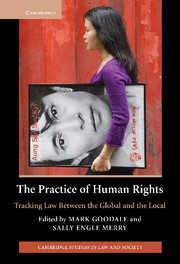Book contents
- Frontmatter
- Contents
- Contributors
- Acknowledgments
- Introduction Locating rights, envisioning law between the global and the local
- PART ONE STATES OF VIOLENCE
- Introduction
- 1 Human rights as culprit, human rights as victim: rights and security in the state of exception
- 2 “Secularism is a human right!”: double-binds of Buddhism, democracy, and identity in Nepal
- PART TWO REGISTERS OF POWER
- PART THREE CONDITIONS OF VULNERABILITY
- PART FOUR ENCOUNTERING AMBIVALENCE
- Conclusion Tyrannosaurus lex: the anthropology of human rights and transnational law
- Index
- References
1 - Human rights as culprit, human rights as victim: rights and security in the state of exception
Published online by Cambridge University Press: 29 March 2011
- Frontmatter
- Contents
- Contributors
- Acknowledgments
- Introduction Locating rights, envisioning law between the global and the local
- PART ONE STATES OF VIOLENCE
- Introduction
- 1 Human rights as culprit, human rights as victim: rights and security in the state of exception
- 2 “Secularism is a human right!”: double-binds of Buddhism, democracy, and identity in Nepal
- PART TWO REGISTERS OF POWER
- PART THREE CONDITIONS OF VULNERABILITY
- PART FOUR ENCOUNTERING AMBIVALENCE
- Conclusion Tyrannosaurus lex: the anthropology of human rights and transnational law
- Index
- References
Summary
In some respects, the recent and unprecedented election to the Bolivian presidency of Evo Morales (widely hailed as the first indigenous person to be elected president of a Latin American nation) can be attributed to his command of the transnational discourse of human rights. In the last several years Bolivia has seen the emergence of powerful social movements demanding greater political inclusion and representation for indigenous peoples, and against the privatization and/or expropriation of natural resources (particularly water and gas), all expressed, in various ways, using the transnational language of human rights. As leader of the Bolivian coca-growers' union and head of the Movimento al Socialismo MAS party (Movement Towards Socialism party), Morales articulated the protest against state and transnational programs of neoliberal political economy as struggles for human and citizens' rights in a context of centuries of indigenous exclusion and exploitation by foreign powers (Goodale, chapter 3 in this volume). Violent state repression of civil protest was critiqued in the same idiom. Like other indigenous activists around the hemisphere, Morales and other leaders and participants in Bolivian social movements have deployed the language of human rights (elaborating their own takes on “indigenous” and “cultural” rights in the process; see Albro 2005) to reframe their struggles for political recognition, social inclusion, and access to land and other natural resources in terms of democratic citizenship, and the right to participate in shaping the future of the Bolivian nation.
- Type
- Chapter
- Information
- The Practice of Human RightsTracking Law between the Global and the Local, pp. 49 - 77Publisher: Cambridge University PressPrint publication year: 2007
References
- 49
- Cited by

